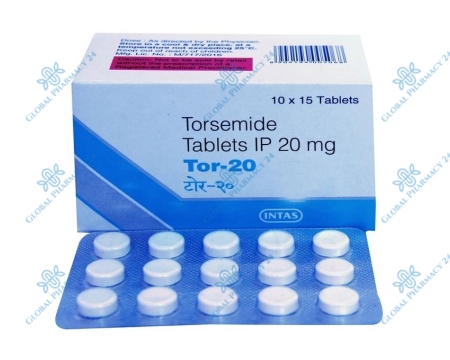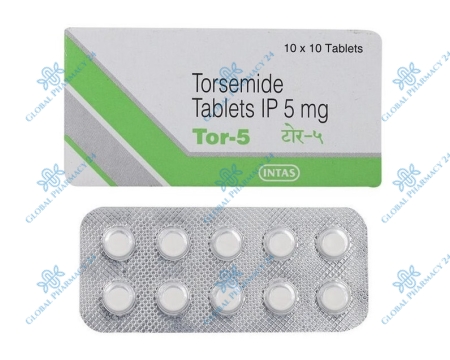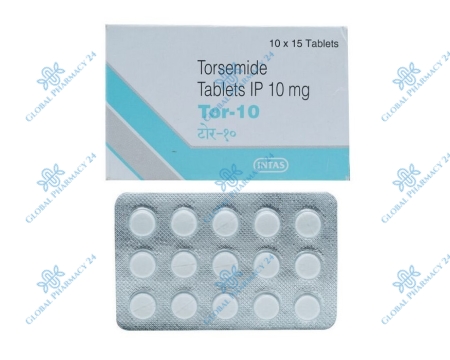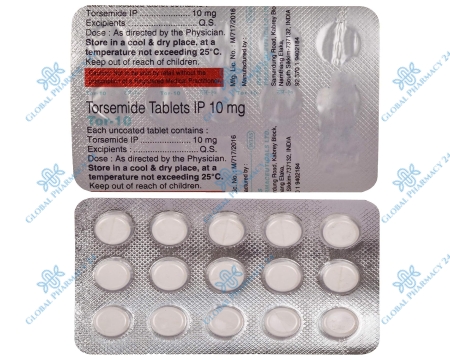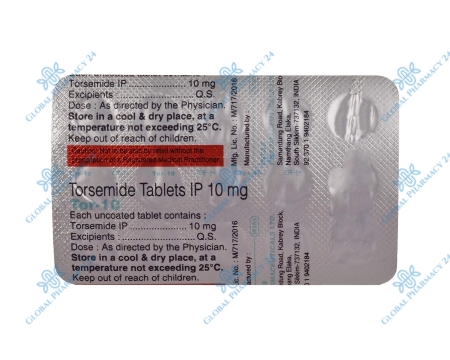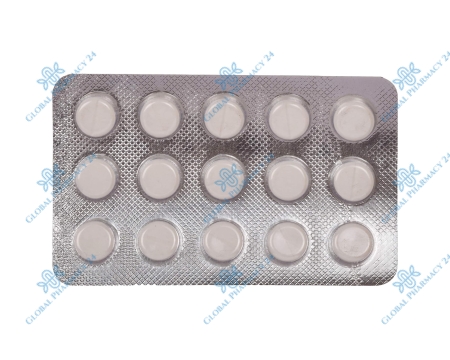| Dosage Forms | Active Ingredient | Duration of Effect | Primary Use |
|---|---|---|---|
| Tablet, Oral solution | Torsemide | 4-6 hours | Management of edema associated with heart failure and chronic kidney disease; treatment of hypertension |
Introduction to Torsemide
Torsemide is a potent diuretic used in the management of edema associated with congestive heart failure, liver cirrhosis, and renal disease, including the nephrotic syndrome. It is also prescribed for the treatment of hypertension, either alone or in combination with other antihypertensive agents. Torsemide operates by preventing the absorption of sodium and water in the kidneys, increasing urine output and thereby reducing fluid in the body.
As a loop diuretic, Torsemide stands out for its high bioavailability and longer duration of action compared to other diuretics in its class. It offers clinicians a valuable tool in the management of conditions characterized by excess fluid accumulation. Its effectiveness in lowering blood pressure and reducing edema makes it a critical component of cardiovascular and renal disease management strategies.
What is Torsemide?
Torsemide is a loop diuretic medication that promotes the excretion of water and salts through the urine. By blocking the reabsorption of sodium and chloride in the kidney's loop of Henle, it effectively reduces fluid accumulation and is instrumental in treating conditions like heart failure, kidney disorders, and hypertension.
Its Role as a Loop Diuretic
As a member of the loop diuretics class, Torsemide is distinguished by its rapid onset and potent diuretic effect. This makes it particularly useful in acute settings where rapid fluid removal is necessary. It is preferred for patients who require a significant diuresis, offering an advantageous pharmacokinetic profile that includes a long half-life and consistent absorption.
Existence of Generic Alternatives
Generic versions of Torsemide are available, providing a cost-effective option for patients and healthcare systems. These alternatives meet the same standards of quality, safety, and efficacy as the brand-name drug, ensuring that patients have access to affordable diuretic therapy.
Similarities and Differences
Generic Torsemide and its brand-name counterpart contain the same active ingredient and exhibit the same pharmacodynamic properties. The primary differences lie in the non-active components, packaging, and price, with generics typically being more affordable.
Understanding the Composition of Torsemide
The effectiveness of Torsemide as a diuretic and antihypertensive agent is largely attributable to its active ingredient, Torsemide itself. This substance operates by inhibiting the sodium-potassium-chloride cotransporter in the thick ascending limb of the loop of Henle, leading to an increase in urine output and a decrease in fluid retention.
Torsemide is available in various forms, including tablets and oral solutions, accommodating different patient needs and preferences. Its formulation is designed for optimal absorption and sustained efficacy, making it a versatile option in diuretic therapy.
Active Ingredients
The active ingredient in Torsemide is the compound Torsemide, a sulfonylurea derivative with potent diuretic effects. It is specifically engineered to target the renal tubules in the kidneys, promoting the elimination of excess fluid and salts.
Chemical Insights into the Active Components
Torsemide's chemical structure enables it to effectively inhibit the reabsorption of sodium and chloride ions, which is a critical mechanism in its diuretic action. This specificity allows for significant fluid reduction with a lower risk of electrolyte imbalance compared to other diuretics.
Packaging and Presentation
Torsemide is packaged to ensure stability and maintain efficacy over time. It is typically available in blister packs or bottles, with clear labeling to inform patients about the dosage and instructions for use. The design of the packaging also considers convenience and safety, facilitating adherence to treatment regimens.
Efficacy of Torsemide and Dosage Guidelines
Torsemide's efficacy in managing edema and hypertension is well-documented, with clinical trials demonstrating significant improvements in symptoms and overall patient well-being. Its role in reducing hospitalizations related to heart failure and improving quality of life for those with chronic kidney disease is particularly notable.
Dosage of Torsemide varies based on the condition being treated, the severity of symptoms, and individual patient factors. Physicians typically start with a low dose and adjust based on the patient's response to treatment. Adherence to prescribed dosage and monitoring by healthcare professionals are crucial for maximizing the benefits of Torsemide.
Conditions and Symptoms Treated by Torsemide
Torsemide is used to treat a wide range of conditions associated with fluid overload, including congestive heart failure, renal dysfunction, and hypertension. Its ability to effectively reduce fluid retention makes it a cornerstone in the management of these diseases.
Dosage Instructions
The initial dosage for Torsemide typically ranges from 10 to 20 mg once daily for hypertension and 20 to 100 mg once daily for edema. Dosage may be adjusted based on therapeutic response and tolerance. For chronic conditions, long-term administration may be necessary under close medical supervision.
Side Effects and Precautions
While Torsemide is an effective medication for fluid retention and hypertension, it is not without potential side effects. Most are mild and manageable, but some may require medical attention. Patients should be aware of these possibilities and report any adverse reactions to their healthcare provider for assessment and management.
Precautions are essential to ensure safe use of Torsemide, especially in individuals with pre-existing conditions or those taking other medications. Healthcare providers will evaluate risks and benefits before prescribing Torsemide, considering factors like renal function, electrolyte balance, and potential drug interactions.
Common and Severe Side Effects
Common side effects of Torsemide include increased urination, dizziness, and electrolyte imbalances. Severe side effects, though rare, may include profound dehydration, significant electrolyte disturbances, and allergic reactions. Immediate medical attention is required for severe side effects.
Preventative Measures
To minimize the risk of side effects, patients are advised to follow their prescription guidelines closely, stay hydrated, and monitor for signs of electrolyte imbalance. Regular follow-ups with a healthcare provider are crucial to adjust the dose as needed and manage any adverse effects.
Precautions During Torsemide Administration
Special caution is advised for patients with renal or hepatic impairment, as Torsemide's effects may be altered in these populations. Monitoring of kidney function, electrolytes, and blood pressure is recommended to ensure safe and effective use of the medication.
Specific Cautions for Individuals with Renal or Hepatic Impairments
Individuals with renal or hepatic impairments require careful dosing and close monitoring due to the increased risk of adverse effects. Adjustments to the dosage may be necessary based on the degree of impairment and the patient's overall clinical status.
List of Advantages and Disadvantages of Torsemide Use
- Advantages:
- Effective in reducing edema and managing hypertension
- Longer duration of action compared to other diuretics
- High bioavailability and consistent absorption
- Generic versions available for cost savings
- Disadvantages:
- Potential for electrolyte imbalance and dehydration
- May require regular monitoring of kidney function and electrolytes
- Not suitable for all patients, especially those with severe renal or hepatic impairment
Concluding Thoughts on Torsemide
Torsemide represents an important option in the management of conditions associated with fluid overload and hypertension. Its efficacy, coupled with a favorable pharmacokinetic profile, makes it a valuable tool in the therapeutic arsenal against these conditions. However, like all medications, it requires judicious use under the guidance of a healthcare professional to maximize benefits while minimizing risks.
Patients considering Torsemide should consult with their healthcare provider to determine if it is the right medication for their specific situation. With proper use and monitoring, Torsemide can significantly improve quality of life for individuals dealing with chronic conditions related to fluid retention and high blood pressure.
When to Seek Medical Attention
If you experience any severe side effects or signs of an allergic reaction while taking Torsemide, seek immediate medical attention. It is also important to contact your healthcare provider if you notice symptoms of electrolyte imbalance or dehydration.
Summary of Key Points
Torsemide is an effective loop diuretic for the treatment of edema and hypertension. Its benefits must be balanced with the potential for side effects, requiring careful monitoring and adherence to prescribed dosages. Ultimately, Torsemide can be a critical component of a comprehensive treatment plan for patients with fluid retention and high blood pressure.
FAQs Torsemide
What is Torsemide used for?
Torsemide is a diuretic medication primarily used to treat fluid retention (edema) in conditions such as congestive heart failure, liver disease, or kidney disorders.
How does Torsemide work?
Torsemide works by increasing the amount of urine produced by the kidneys, which helps the body get rid of excess water and salt.
What are the common side effects of Torsemide?
Common side effects of Torsemide may include dizziness, headache, dehydration, electrolyte imbalances (such as low potassium or magnesium levels), and increased urination.
Can Torsemide be taken with other medications?
It's important to consult with a healthcare professional before taking Torsemide with other medications, as it may interact with certain drugs, including other diuretics, ACE inhibitors, or nonsteroidal anti-inflammatory drugs (NSAIDs).
How should Torsemide be taken?
Torsemide should be taken exactly as prescribed by a healthcare provider. Typically, it is taken orally, with or without food. It's important to take it at the same time(s) each day to maintain a consistent level in the bloodstream.
Is Torsemide safe for everyone?
Torsemide may not be safe for everyone, particularly individuals with certain medical conditions such as severe kidney dysfunction or an allergy to sulfa drugs. Pregnant or breastfeeding women should also consult with a healthcare provider before taking Torsemide.


